
Chinese steel imports could lead Usiminas to shut down blast furnace
Nov, 22, 2023 Posted by Gabriel MalheirosWeek 202343
Usiminas is preparing to follow in the footsteps of other steel mills in Brazil and reduce production in the face of a growing influx of imported steel. The company, which has just invested R$2.7 billion in the modernization of a blast furnace in Ipatinga, in the state of Minas Gerais, is considering shutting down the operation of another blast furnace at the plant, a measure attributed to the strong advance of imports, especially from China, and the decline in domestic sales of the Brazilian industry.
According to the steelmaker’s vice president for strategic affairs, Sergio Leite, one of the company’s blast furnace could be shut down later this year if there are no effective measures to curb the influx of imported steel. “The situation is delicate. We’re very worried about the future,” he told Valor.
The steel companies installed in the country have been pressuring the government to raise the import tax on steel to 25% from 9.6%, bringing it in line with the tariffs practiced by the United States and the European Union, but the demand faces strong resistance from the consumer sector and in Brasília. Prior to Usiminas, Gerdau laid off 700 workers and ArcelorMittal shut down its factories, furloughing 400 workers.
Asked on Tuesday (21) about the possibility of raising tariffs, Vice President Geraldo Alckmin, said that “this has already been done,” recalling that during the first year of President Lula’s term in office, the Chamber of Foreign Trade (Camex) reversed a 10% tariff cut made during the Bolsonaro administration.
“Competitiveness is a problem in several sectors,” Mr. Alckmin, who is also Brazil’s minister of Development, Industry, Trade, and Services, told reporters after an event at the National Confederation of Industry (CNI), citing the chemical industry as an example. Mr. Alckmin also noted that earlier this year, the United States lifted a 74.52% tax on carbon steel plates from Brazil. “That also helps [the sector in Brazil],” he said.
According to Mr. Leite, Usiminas has already reduced the pace of production in Cubatão and closed the service center in São Paulo in the wake of the “perfect storm” hitting the sector—domestic sales and exports fell by up to 8% in 10 months, while imports increased by around 60%. This mismatch has led to an increase in the share of imports in apparent consumption from an average of 12% over the last 10 years to 24% in 2023. It has also increased industry idleness to around 40%.
China alone, said the executive, is expected to sell 3 million tonnes of steel to the Brazilian market in 2023, “at prices below the cost of production,” the same volume that Usiminas’s blast furnace 3, which has just been reopened after investments, can produce. In the early 2000s, the Asian country exported 12,000 tonnes to Brazil.
“From January to October, imports grew by 60%, and we still don’t know where it’s going. That’s the big question,” he said. The reading in the industry is that China will stick to its strategy of being a major steel exporter, reaching shipments of 100 million tonnes this year. In October alone, 80% of the imported steel entering the Brazilian market was Chinese.
The chart below – developed with DataLiner data – shows Brazilian steel imports (hs 7326) from Jan 2020 and Sep 2023.
Steel imports from China | Jan 2020 – Sep 2023 | TEU
Source: DataLiner (click here to request a demo)
According to Mr. Leite, the decision on the possible shutdown should be made later this year and will affect Blast Furnace 1 in Ipatinga, which has a production capacity of 600,000 tonnes per year of pig iron, which is converted into steel. Usiminas has another blast furnace with a similar capacity, and at the beginning of the pandemic it also decided to shut down Blast Furnace 1 in the face of falling demand.
According to the executive, the decision to shut down should have been made by now, but the company preferred to wait for the results of the industry’s talks with the federal government. The increase in imports worsened from May, when Blast Furnace 3 was out of service. “We tried to maintain the pace of production, but with the return of the blast furnace, the situation changes.”
The advance of imports is jeopardizing investment plans, according to steelmakers. On average, investments have been around R$12 billion per year, and the plan is to maintain this pace. If the current scenario continues, Mr. Leite said, this goal may not be achieved. “The steel industry in Brazil is competitive and technologically advanced. What we can’t have is a market where imports can easily enter without protection,” Mr. Leite said.
Source: Valor Econômico
Click here to read the original article in Portuguese: https://valor.globo.com/empresas/noticia/2023/11/22/aco-chines-pode-levar-usiminas-a-desligar-alto-forno.ghtml
-
Other Cargo
Dec, 12, 2023
0
Brazil sees remarkable 100% surge in egg exports in November
-
Grains
Oct, 19, 2023
0
Brazil increases share in EU soybean imports as of October 15, 2023
-
Trade Regulations
Jul, 05, 2021
0
FAO and OECD project that Brazil will increase its weight as a food producer
-
Ports and Terminals
Dec, 27, 2023
0
Record in the works: Port of Santos witnesses 29.4% surge in cargo throughput for November



